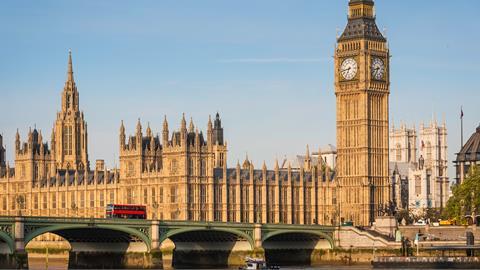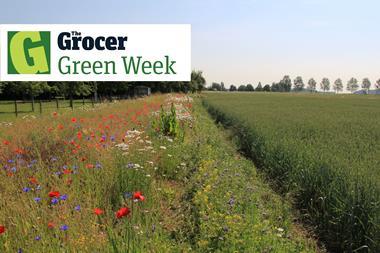After a government reshuffle with huge implications for the food industry, Defra has achieved a first.
The new leadership pairing of environment secretary Emma Reynolds and minister Angela Eagle landing at Defra is believed to be the first-ever arrival in government of an all-female ministerial team.
That, however, is where the refreshing change stops. In every other way, this is evidence of more of the same chaos, stop-start leadership and lack of prime ministerial backing that has haunted Defra for years and leaves the food industry, temporarily at least, dealing with a damaging knowledge vacuum at the top.
With Labour’s new food strategy not even really off the ground yet, losing Steve Reed to Housing, Communities & Local Government in the reshuffle represents the latest turbulence in the helter-skelter history of Defra. The brutal sacking of Daniel Zeichner, the man who has fronted talks with the industry on its food strategy while also fending off furious protests by farmers, only adds to the instability.
Starting from scratch
The changes come after promises that the government would learn from previous food policy mistakes, to deliver something with true cross-government support. A claim that now looks vaguely ridiculous amid all the blood on the Westminster carpet.
As Reynolds becomes the sixth environment secretary in the past five years, months of work on the food strategy – which is supposed to shape the future of the sector for years to come – will, inevitably, face a reset.
It is, of course, too soon to judge the new leadership duo.
In Reynolds, the department has a fast-rising new leader, who will benefit from having fresh insight into Treasury thinking, while Eagle is one of Labour’s most experienced and respected figures..
Yet it’s hard to feel anything but a huge sense of frustration that, once again, the department is starting out from scratch, adding to suspicions that it resides far down the government pecking order of importance.
Some believe the writing has been on the wall for a while, with The Grocer revealing in July that plans for a white paper – intended to give real weight to the food strategy’s good intentions – had been scrapped after the personal intervention of the PM.
At the time a leading industry source told The Grocer: “It shows Defra’s place in the Whitehall hierarchy is as low as it’s ever been.
“It seems like Defra has been speaking to everyone apart from the ones that hold the purse-strings.”
Focus on food
Now, regardless of the credentials of the new arrivals, the PM has signalled his lack of engagement with the food strategy. This comes just at a time when talks were about to get underway about, to use his own phrase, how to move it the strategy into phase 2 – actually ’getting things done’.
Despite the way things appear, some industry sources still managed to look at the changes with a glass half full.
One told The Grocer they expected the government to put far more emphasis on the food strategy, as with the reshuffle, more generally, on creating growth.
“Defra has a lot to do and it really needs to focus on growth above all else – which we expect is the brief given to Reynolds,” they said.
“There was a lot of laudable ambition in the food strategy but to deliver it and bring businesses along, there has to be a focus on how to work with industry to grow and invest.”
An FDF spokesman said: “We’re looking forward to engaging as soon as possible with the new secretary of state and her team. Food and drink manufacturers are supportive of what the government is trying to achieve through Defra’s new food strategy, including on building a more resilient, productive and healthier food system.
“But we need more focus on how our sector realises significant productivity gains, and how we attract more investment in R&D and innovation. Without this, we’ll lose production overseas. As part of this, government should look hard at rationalising and bearing down on a raft of regulatory costs, from higher costs of employment to the new packaging tax. If they don’t, the real risk is that these persistent high costs disincentivise the very investment our sector needs, not least to curb food inflation over time.”
Farm friendly
Indeed, when Zeichner announced the outcomes framework in July, it was the lack of specific policies, especially ones that would kickstart growth and jobs in the industry, that many criticised.
However, there will also be a great deal of sympathy for the man who, with an absence of self-publicity and little fanfare, had carved out a reputation for grasping the detail of food industry issues in a way that would have been inconceivable for many of the less than heroic figures who went before him.
He also managed to juggle fronting the food strategy with fending off farmers – almost literally in April, when he became trapped in a taxi surrounded by an angry mob protesting about the Inheritance Tax reforms he had been forced to push through, even though they were the work of Reynolds’ old department.
“Zeichner was given a hospital pass by HMT on the family farm tax, without being consulted on the change, but the fact he maintained positive relations with the farming industry is a measure of the man, as a top bloke,” is how one top industry source put it today.
As Zeichner packs up his ministerial briefcase and takes his expertise with him, and Reed heads off to housing with a rallying cry of ‘build, baby, build’, it’s once again time for a reset at Defra, where the ministerial foundations seem as flimsy as some of the excuses for not paying enough tax.




















No comments yet